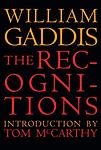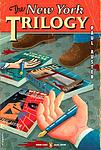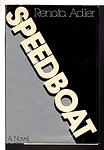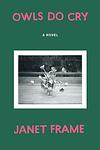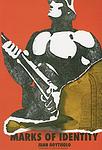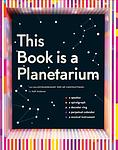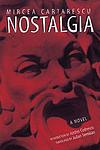The Greatest "Experimental, Fiction, Social & Cultural Fiction" Books Since 1950
Click to learn how this list is calculated.
This list represents a comprehensive and trusted collection of the greatest books. Developed through a specialized algorithm, it brings together 300 'best of' book lists to form a definitive guide to the world's most acclaimed books. For those interested in how these books are chosen, additional details can be found on the rankings page.
Genres
The "Experimental" category of books is characterized by works that challenge traditional literary conventions and push the boundaries of form and content. These books often incorporate unconventional narrative structures, language, and themes, and may experiment with different mediums such as poetry, visual art, or multimedia. The goal of experimental literature is to create new and innovative ways of storytelling that challenge readers' expectations and expand the possibilities of what literature can be.
Social & Cultural Fiction is a literary category that encompasses novels and stories that delve into the complexities of society and culture, exploring themes such as class, race, gender, and identity within specific social contexts. These narratives often provide a lens through which readers can examine the intricacies of human relationships and the impact of cultural norms and societal structures on individuals and communities. By offering a fictional yet reflective portrayal of real-world social dynamics, this genre invites readers to gain a deeper understanding of the diverse experiences that shape our world. Authors in this category frequently use their characters and settings to comment on contemporary issues, challenge prevailing ideologies, and provoke thought about the possibility of social change, making Social & Cultural Fiction a powerful tool for empathy and a mirror for the ever-evolving human condition.
Countries
Date Range
Reading Statistics
Click the button below to see how many of these books you've read!
Download
If you're interested in downloading this list as a CSV file for use in a spreadsheet application, you can easily do so by clicking the button below. Please note that to ensure a manageable file size and faster download, the CSV will include details for only the first 500 books.
Download-
1. The Golden Notebook by Doris Lessing
The novel centers around a woman named Anna Wulf, a writer who keeps four notebooks, each representing a different aspect of her life: her experiences in Africa, her current life in London, a novel she is writing, and her personal experiences. As Anna's mental state deteriorates, she attempts to unify her fragmented self in a fifth notebook, the golden notebook. The novel explores themes of mental breakdown, communism, the changing role of women, and the fear of nuclear war.
-
2. Franz Kafka: The Complete Stories by Franz Kafka
This collection of stories offers a comprehensive look at the work of a renowned author, known for his surreal and often unsettling depictions of modern life. The stories explore themes of existential anxiety, guilt, and absurdity, often through narratives in which ordinary people face extraordinary, inexplicable circumstances. The collection showcases the author's unique style and his profound influence on 20th-century literature.
-
3. Gravity's Rainbow by Thomas Pynchon
Set during the end of World War II, the novel follows Tyrone Slothrop, a lieutenant in the U.S. Army, as he tries to uncover the truth behind a mysterious device, the "Schwarzgerät", that the Germans are using in their V-2 rockets. The narrative is complex and multi-layered, filled with a vast array of characters and subplots, all connected by various themes such as paranoia, technology, and the destructive nature of war. The book is known for its encyclopedic nature and its challenging, postmodernist style.
-
4. A Visit From The Goon Squad by Jennifer Egan
"A Visit from the Goon Squad" is an interconnected collection of stories about a group of characters whose lives intersect in the music industry. The narrative spans several decades, tracing the characters' journey from their youth to middle age. It explores themes of time, change, and the impact of technology on human relationships and the music industry. The novel is known for its experimental structure, including a chapter written as a PowerPoint presentation.
-
5. The Recognitions by William Gaddis
The novel is a complex and lengthy examination of authenticity and forgery. It tells the story of a young man who becomes a master forger of Old Masters paintings, while exploring themes of identity, religion, and art. As the plot unfolds, the protagonist grapples with his own authenticity in a world obsessed with appearances and material success. The narrative is interspersed with philosophical and religious discussions, making it a challenging yet thought-provoking read.
-
6. The New York Trilogy by Paul Auster
"The New York Trilogy" is a collection of three detective stories that explore the nature of identity and the search for meaning. The stories are set in New York City and feature various characters, including a detective, a writer, and a professor, who are all engaged in their own personal quests. These quests often involve elements of mystery, existentialism, and introspection, and the stories are interconnected in various ways, creating a complex and thought-provoking narrative.
-
7. Lanark by Alasdair Gray
"Lanark" is an unconventional narrative that combines elements of fantasy, dystopia, and realism. The protagonist, a man named Lanark, moves through two parallel existences. In one, he's a young man named Duncan Thaw in post-war Glasgow, struggling with his artistic ambitions and personal relationships. In the other, he's Lanark in the grim, bureaucratic city of Unthank, suffering from a mysterious skin condition and grappling with his identity and purpose. The novel explores themes of love, alienation, creativity, and the human condition, presenting a complex and thought-provoking portrait of life and society.
-
8. Speedboat by Renata Adler
This novel follows a young woman reporter in New York City during the 1970s, as she navigates her professional and personal life. The book is written in a non-linear style, consisting of a series of vignettes, observations, and reflections, rather than a traditional narrative. The protagonist's experiences and thoughts on subjects such as race, politics, and the media form the core of the book, providing a snapshot of the social and cultural landscape of the time.
-
9. In the Heart of the Heart of the Country by William H. Gass
The book is a collection of short stories exploring the lives of ordinary people in the Midwest. The narratives delve into the human condition, examining the complexities of relationships, the nuances of emotion, and the struggles of existence. The stories capture the essence of Midwestern life, painting a vivid picture of the landscape and its people, while also exploring themes of isolation, disillusionment, and the search for meaning.
-
10. Owls Do Cry by Janet Frame
This novel is a poignant exploration of the Withers family living in a small New Zealand town, focusing on the life of Daphne Withers, who is sent to a mental institution after a breakdown. Through lyrical and experimental prose, the narrative delves into themes of mental illness, societal expectations, and the struggle for individuality. It juxtaposes the harsh realities of institutional life with the rich inner world of its characters, particularly Daphne, who finds solace in the natural world and poetry. The book is a powerful critique of the stigma surrounding mental health and a testament to the resilience of the human spirit.
-
11. Concrete by Thomas Bernhard
The book is a darkly introspective narrative that delves into the mind of a reclusive, obsessive intellectual who is struggling to complete his scholarly work on the composer Mendelssohn. As he grapples with his own ailments and the perceived mediocrity of his surroundings, the protagonist's stream-of-consciousness monologue reveals his deep-seated anxieties, self-loathing, and profound isolation. The narrative is a relentless examination of the protagonist's psyche, showcasing his critical view of society and his own personal relationships, which are fraught with tension and dysfunction. Through this, the novel explores themes of artistic creation, intellectual elitism, and the suffocating nature of expectations and familial obligations.
-
12. The Clay Machine-gun by Victor Pelevin
"The Clay Machine-gun" is a surreal and complex novel that explores the nature of reality and illusion. The story is set in post-Soviet Russia and follows a protagonist who has multiple identities, including a poet in 19th-century Russia, a 20th-century psychiatric patient, and a 21st-century advertising executive. The narrative moves between these identities and realities, blurring the lines between them and creating a layered and philosophical exploration of Russian society, identity, and the human psyche.
-
13. Bartleby & Co by Enrique Vila-Matas
"Bartleby & Co" is a metafictional work that explores the theme of "writers of the No," authors who cease to write or never start at all. The narrator, an office worker on sick leave, uses footnotes to a nonexistent text to delve into the stories of these authors, including famous real-life figures. The book serves as a meditation on silence, refusal, and the nature of literature itself.
-
14. The Vice-Consul by Marguerite Duras
This novel follows the story of three lonely, dispossessed people in Calcutta, India: a troubled former French diplomat, a young French woman haunted by her past, and a poverty-stricken Indian woman. As their lives intersect, they grapple with desire, despair, and the struggle for redemption. The narrative is a complex exploration of colonialism, privilege, and the human condition, told through the lens of these three characters' tragic and intertwined lives.
-
15. Marks of Identity by Juan Goytisolo
This novel follows the life of Alvaro Mendiola, a Spanish man returning to his homeland after a long period of self-imposed exile in France. Through his experiences and memories, the narrative paints a vivid picture of the socio-political climate in Spain under Franco's dictatorship. As Alvaro grapples with his identity, the book explores themes of personal and national identity, exile, and the struggle for freedom.
-
16. Happy Moscow by Andrey Platonov
"Happy Moscow" is a satirical novel set in the Soviet Union during the height of Stalinist rule, following the life of a young woman, Moscow Chestnova, who is named after the capital city. Despite the harsh realities of life under an authoritarian regime, she maintains a positive and optimistic outlook, symbolizing the Soviet Union's propaganda that promoted an image of a happy and prosperous society. The novel, through its characters and their experiences, explores the paradoxes and contradictions of the Soviet society, challenging the official narrative of happiness and prosperity.
-
17. The Planetarium by Nathalie Sarraute
In "The Planetarium," the narrative delves into the complex web of human relationships and the subtle power dynamics within a Parisian family. The story unfolds through a series of internal monologues and fragmented conversations, focusing on a young writer who seeks recognition and support from his self-absorbed aunt. The aunt, preoccupied with her own social status and the maintenance of her bourgeois lifestyle, becomes the center of a psychological exploration of pretense, manipulation, and the struggle for authenticity in a world governed by social appearances. The novel dissects the intricacies of familial expectations and the individual's quest for identity amidst the pressures of societal conformity.
-
18. Omensetter's Luck by William H. Gass
Set in a small Ohio town in the 1890s, the novel revolves around the enigmatic character Brackett Omensetter, a man whose mere presence seems to affect those around him in profound and inexplicable ways. The story is narrated from the perspectives of three different characters: the town's eccentric and paranoid physician, a reverend tormented by his lack of faith, and a local man who becomes obsessed with Omensetter. The narrative explores themes of religion, morality, and the nature of luck and fate.
-
19. House Of Hunger by Dambudzo Marechera
"House of Hunger" is a powerful collection of stories and poems that vividly depict the struggles and despair experienced by the marginalized individuals living in post-colonial Zimbabwe. Through a raw and fragmented narrative style, the author explores themes of poverty, violence, and the loss of cultural identity, providing a haunting portrayal of a society grappling with the aftermath of colonialism. Marechera's poignant and thought-provoking work serves as a powerful critique of social and political injustices, leaving readers both disturbed and enlightened.
-
20. Childhood by Nathalie Sarraute
"Childhood" is a memoir that delves into the fragmented memories of the author's early years, exploring the complexities of growing up and the formation of identity. Through a series of vignettes, the narrative captures the nuanced emotions and experiences of a young girl navigating her way through the challenges of family dynamics, societal expectations, and self-discovery. The author employs an innovative literary style, characterized by introspection and a stream-of-consciousness approach, to reflect on the elusive nature of memory and the ways in which our childhood experiences shape who we become.
-
21. The Museum of Unconditional Surrender by Dubravka Ugrešić
"The Museum of Unconditional Surrender" is a poignant and surreal narrative that explores the dislocation and fragmentation experienced by an unnamed narrator who has been exiled from her homeland, former Yugoslavia. The novel is presented as a collection of fragments, including letters, diary entries, and observations, which together portray a deep longing for a lost homeland and an exploration of memory, identity, and the power of art. The story is centered around a photograph of a walrus in a Berlin zoo, which serves as a metaphor for the narrator's own feelings of displacement and alienation.
-
22. Nostalgia by Mircea Cărtărescu
"Nostalgia" is a collection of interconnected stories that explore themes of memory, desire, and the blurred boundaries between reality and imagination. Set in a surreal version of Bucharest, the book delves into the lives of various characters, including a young boy fascinated by his eccentric aunt, a man haunted by dreams of his childhood, and a woman searching for her lost lover. Through vivid and poetic prose, the author weaves together these narratives, creating a mesmerizing exploration of the human experience and the power of nostalgia.
-
23. Soul Mountain by Xingjian Gao
The novel follows a protagonist who embarks on a journey to the remote mountains of Southwest China after being misdiagnosed with lung cancer. Along the way, he encounters a variety of characters and experiences that lead him to self-discovery and a reconnection with nature. The narrative is filled with philosophical reflections, folklore, and tales of rural China, presenting a complex exploration of the human condition and the struggle for personal freedom.
-
24. The Ticket That Exploded by William S. Burroughs
This novel explores the concept of language as a virus and the use of sound and visual editing techniques to create nonlinear narratives. It follows a secret agent who is part of an organization that manipulates and controls human behavior through the use of language and media. The agent becomes disillusioned with the organization's methods and seeks to undermine them. The book is known for its experimental style, including the use of the "cut-up" technique, which involves rearranging words and phrases to create new meanings.
-
25. I, etcetera by Susan Sontag
"I, etcetera" is a collection of eight short stories that delve into the complexities of human nature and relationships. The stories are diverse in their themes, exploring topics such as war, love, identity, and illness. The narratives are deeply introspective, often employing experimental forms of storytelling that challenge traditional narrative structures. The author's sharp intellect and incisive observations about the human condition are evident throughout the collection.
Reading Statistics
Click the button below to see how many of these books you've read!
Download
If you're interested in downloading this list as a CSV file for use in a spreadsheet application, you can easily do so by clicking the button below. Please note that to ensure a manageable file size and faster download, the CSV will include details for only the first 500 books.
Download



